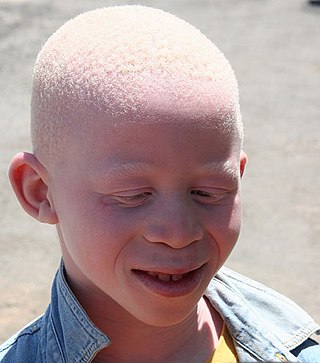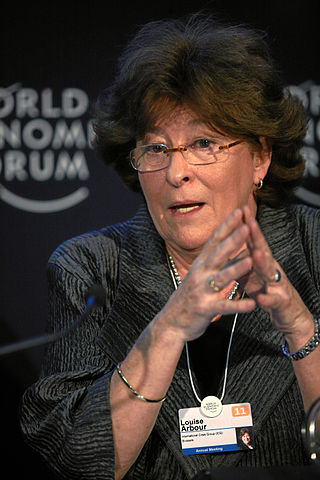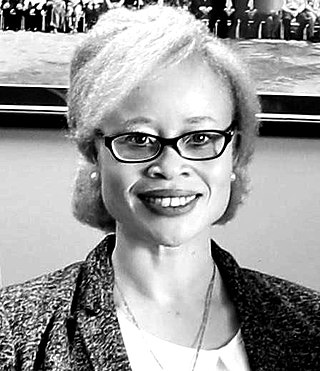Related Research Articles

The University for Peace (UPEACE) is an international university and intergovernmental organization established as a treaty organisation by the United Nations General Assembly in 1980. The university offers postgraduate, doctoral, and executive programmes related to the study of peace and conflict, environment and development, and international law.
Economic, social and cultural rights (ESCR) are socio-economic human rights, such as the right to education, right to housing, right to an adequate standard of living, right to health, victims' rights and the right to science and culture. Economic, social and cultural rights are recognised and protected in international and regional human rights instruments. Member states have a legal obligation to respect, protect and fulfil economic, social and cultural rights and are expected to take "progressive action" towards their fulfilment.

The human right to water and sanitation (HRWS) is a principle stating that clean drinking water and sanitation are a universal human right because of their high importance in sustaining every person's life. It was recognized as a human right by the United Nations General Assembly on 28 July 2010. The HRWS has been recognized in international law through human rights treaties, declarations and other standards. Some commentators have based an argument for the existence of a universal human right to water on grounds independent of the 2010 General Assembly resolution, such as Article 11.1 of the International Covenant on Economic, Social and Cultural Rights (ICESCR); among those commentators, those who accept the existence of international ius cogens and consider it to include the Covenant's provisions hold that such a right is a universally binding principle of international law. Other treaties that explicitly recognize the HRWS include the 1979 Convention on the Elimination of All Forms of Discrimination Against Women (CEDAW) and the 1989 Convention on the Rights of the Child (CRC).

Yōhei Sasakawa is chairman of The Nippon Foundation, the World Health Organization Goodwill Ambassador for Leprosy Elimination, and Japan's Ambassador for the Human Rights of People Affected by Leprosy. His global fight against leprosy and its accompanying stigma and social discrimination is an issue to which he has remained highly committed for more than 40 years. As chairman of The Nippon Foundation, Japan's largest charitable foundation, he guides public-interest activities in modern Japan. Sasakawa received his degree from Meiji University’s School of Political Science and Economics. Sasakawa's father was businessman, politician, and philanthropist Ryōichi Sasakawa.

The Convention on the Rights of Persons with Disabilities is an international human rights treaty of the United Nations intended to protect the rights and dignity of persons with disabilities. Parties to the convention are required to promote, protect, and ensure the full enjoyment of human rights by persons with disabilities and ensure that persons with disabilities enjoy full equality under the law. The Convention serves as a major catalyst in the global disability rights movement enabling a shift from viewing persons with disabilities as objects of charity, medical treatment and social protection towards viewing them as full and equal members of society, with human rights. The convention was the first U.N. human rights treaty of the twenty-first century.

Persecution of people with albinism is based on the belief that certain body parts of albinistic people hold supernatural powers. Such beliefs are present in some parts of the African Great Lakes region, and have been exploited by witchdoctors who use such body parts as ingredients in religious rituals which are claimed to bring prosperity.

Human rights and climate change is a conceptual and legal framework under which international human rights and their relationship to global warming are studied, analyzed, and addressed. The framework has been employed by governments, United Nations organizations, intergovernmental and non-governmental organizations, human rights and environmental advocates, and academics to guide national and international policy on climate change under the United Nations Framework Convention on Climate Change (UNFCCC) and the core international human rights instruments. In 2022 Working Group II of the IPCC suggested that "climate justice comprises justice that links development and human rights to achieve a rights-based approach to addressing climate change".
Cephas Lumina is a Zambian lawyer and human rights expert. From 2008 to 2014 he was the "United Nations Independent Expert on the effects of foreign debt and other related international financial obligations of States on the full enjoyment of all human rights, particularly economic, social and cultural rights", appointed by the United Nations Human Rights Council. He was succeeded by the Argentine lawyer Juan Pablo Bohovslavsky.

Agnès Callamard is a French human rights activist who is the Secretary General of Amnesty International. She was previously the Special Rapporteur on extrajudicial, summary, or arbitrary executions appointed by the United Nations Human Rights Council, and the former Director of the Columbia University Global Freedom of Expression project.

Isaac Maigua Mwaura is the current Government Spokesman of Kenya, a former Senator as well as a former Cabinet Administrative Secretary (CAS) - Deputy Minister in the Office of Prime Cainet Secretary. Mwaura served as a Senator in Kenya's Senate under the Jubilee Party between 2017 and 2022 where he was nominated to represent Persons with Disabilities between 2017 and 2022. He was the third person to occupy that position under the Constitution of Kenya, 2010. He also served as member of Parliament in the National Assembly from 2013 to 2017 after being nominated by the Orange Democratic Movement Party to represents special Interest Groups. He was the first Member of the National Assembly (MP) and Senator in Kenya with albinism. He is a member of the United Democratic Alliance Party (UDA) which is the ruling party under the Kenya Kwanza Administration of President William Samoei Ruto.

Women in law describes the role played by women in the legal profession and related occupations, which includes lawyers, paralegals, prosecutors, judges, legal scholars, law professors and law school deans.

The Southern Africa Litigation Centre or SALC is a non-profit organisation based in Johannesburg, South Africa. It was founded in 2005 by Dr. Mark Ellis and Dr. Tawanda Mutasah. They conceptualised the organisation and hired Nicole Fritz who served as the first director for ten years. Later, Kaajal Ramjathan-Keogh was appointed director and replaced by Anneke Meerkotter, who currently leads the organisation.

Catalina Devandas Aguilar is a Costa Rican lawyer who served as the first United Nations Special Rapporteur on the Rights of Persons with Disabilities from 2014 until 2020. She currently serves as Permanent Representative of Costa Rica to the United Nations at Geneva. Previously, she worked for the World Bank and took part in the establishment of the Convention on the Rights of Persons with Disabilities with the United Nations Secretariat. She has spina bifida and uses a wheelchair.

Victor Madrigal-Borloz is a Costa Rican lawyer. Since 2018, he has served as the United Nations Independent Experton protection against violence and discrimination based on sexual orientation and gender identity . During his tenure at the U.N., Madrigal-Borloz has been noted for focusing his Human Rights Council mandate on investigating a broad and intersectional range of issues facing LGBT communities around the world, including conversion therapy, criminalization, socio-cultural exclusion, anti-trans rhetoric, and the outsized impact of the COVID-19 pandemic on vulnerable LGBT and gender-diverse populations.

Ikponwosa "I.K." Lauretta Ero is a lawyer and advocate in the field of international human rights. She is the first United Nations Independent Expert on the enjoyment of human rights by persons with albinism. Ero was a key player in drawing global attention to the human rights issues faced by people with albinism worldwide, particularly in the region of Africa where they were being attacked for their body parts.
E. Tendayi Achiume is a Professor of Law and former Faculty Director of the Promise Institute for Human Rights at the University of California, Los Angeles. She served as the United Nations special rapporteur on Racism, Racial Discrimination, Xenophobia and Related Intolerance from her appointment in September 2017 until November 2022. She was the first woman appointed to this position since its creation in 1993.
Rosa Kornfeld-Matte is from Chile. She was the first United Nations Independent Expert on the enjoyment of all human rights by older persons, from May 2014 until May 2020.

Claudia Mahler is an Austrian academic who became the second UN Independent Expert on the human rights of older persons at the United Nations Human Rights Council. Dr. Mahler assumed her role as Independent Expert in May 2020. She is also a senior researcher in the field of economic, social and cultural rights for the German Institute for Human Rights since 2010. She was also a visiting professor at the Alice Salomon Hochschule in 2020–2021.
Aoife Nolan is an Irish academic who is Professor of International Human Rights Law and Director of the University of Nottingham Human Rights Law Centre. She is President of the Council of Europe's European Committee of Social Rights, and an international advisor on the rights of the child and economic and social rights and strategic legal implications. She has led international research projects and acted as a consultant to United Nations or other global institutions on human rights and strategic law.

Isha Lanla Dyfan is a Sierra Leonean lawyer who became the United Nation's Independent Expert on the Situation of Human Rights in Somalia in 2020. She has previously worked for the United Nations–African Union Mission in Darfur and Amnesty International.
References
- 1 2 3 "About". International Network Against Witchcraft Accusation and Associated Harmful Practices. Retrieved 2024-06-15.
- 1 2 "Ms. Muluka-Anne Miti-Drummond, UN Independent Expert on the enjoyment of human rights by persons with albinism". OHCHR . Retrieved 15 June 2024.
- ↑ "We Join the Bullies". southern africa litigation centre. Retrieved 15 June 2024.
- ↑ "Visit to Madagascar - Report of the Independent Expert on the enjoyment of human rights by persons with albinism, Muluka-Anne Miti-Drummond (A/HRC/52/36/Add.1) - Madagascar | ReliefWeb". reliefweb.int. 2023-03-06. Retrieved 2024-06-15.
- ↑ "Country visits".
- ↑ "The right to education for persons with albinism". Right to Education Initiative. Retrieved 2024-06-15.